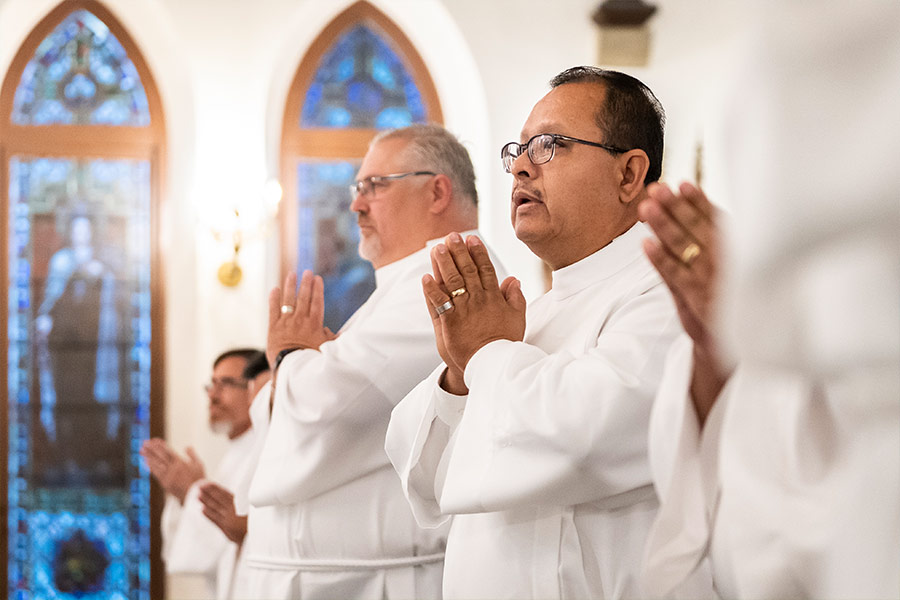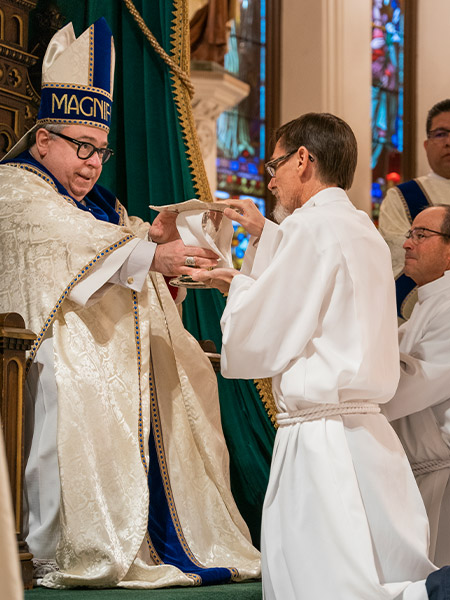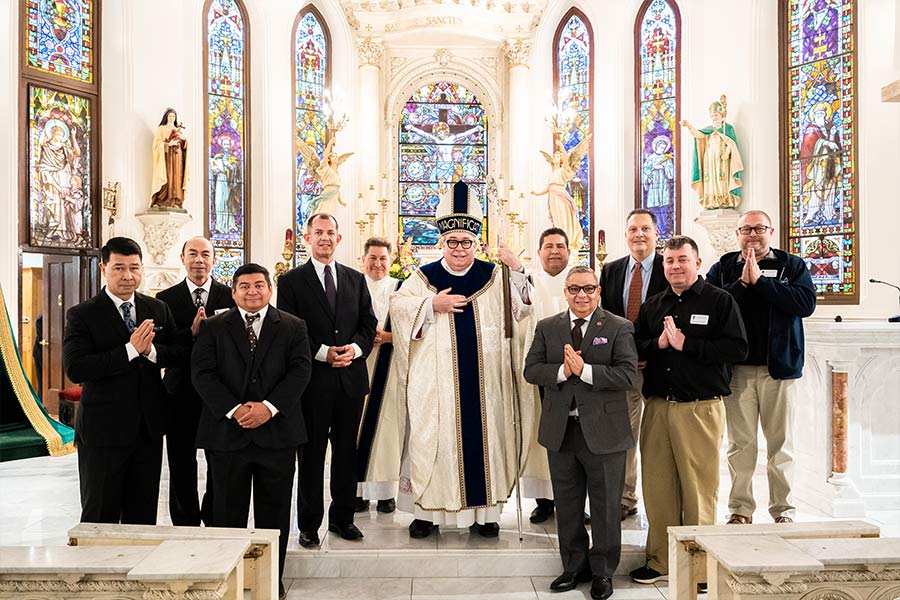Deacon candidates take steps forward in vocational, discernment journey

Sergio Vera stands with other members of the diaconal Class of 2022 during the Mass for the Rite of Admission to Candidacy for Holy Orders and Institution of Lectors and Acolytes on Nov. 6, 2021 at St. Patrick Cathedral. Six members of the Class of 2022 were instituted as acolytes by Bishop Michael Olson. (NTC/Juan Guajardo)
FORT WORTH — “Faith begins with listening to God,” Bishop Michael Olson proclaimed from his pulpit at St. Patrick Cathedral during a Nov. 6 Mass during which seven men took major steps forward in their journeys toward the permanent diaconate.
At the morning liturgy, one aspirant was admitted to candidacy for the Class of 2024, and six candidates from the Class of 2022 were instituted as acolytes; one of those six also received the Ministry of Lector.
For those seven diaconal candidates, listening for the voice of God is critical as they journey together through a six-year process to become permanent deacons for the Diocese of Fort Worth.
“The whole call to the diaconate is an extremely unique journey in life,” said Alfred Mosco, who received the Ministry of Acolyte during the Mass. “It’s unlike anything else I’ve experienced in the corporate world or in the secular world because the Holy Spirit is very much involved in this. It’s just a very, very unique and beautiful journey.”
Mosco is one of 10 candidates in formation for the Class of 2022.
Although each felt the call toward this vocation in a different way, all seven are compelled to discern well, and God willing, to receive Holy Orders after the process.
“God’s calling is kind of a mystery,” said Alan Vu, who was admitted as a candidate for the class of 2024. “We can only see it in the eyes of faith...To me, the calling is always there, and God asked me for the past four years to discern His calling. Now, I think I am fully ready to respond to His call, and it’s a blessing.”
In the Diocese of Fort Worth, the process of discernment takes a total of six years. In the first two years, men begin a stage called aspirancy, during which they attend workshops, seminars, and classes with their wives to see if they “have the seeds of the vocation to the diaconate,” Director of Diaconal Formation Juan Rendon explained.
After these two years of heavy discernment, they must then petition the bishop for admission to candidacy by writing a letter about their calling.
Vu was formally accepted at this ceremony to begin the second part of his journey. He is one of two men in the Class of 2024.
“I am really excited,” Vu, a Vietnamese Martyrs parishioner, said. “It’s a blessing to be called to be a candidate... I am blessed to be called to be the Lord’s instrument. We always need God’s grace to work on us.”
Candidacy encompasses the remaining four years of their formation, in which they are prepared for ministry through the study of homiletics, liturgical, theological and sacramental formation, and more.
They are guided by a formation director, participate as members of prayer groups, and are assigned to pastoral outreach in different field settings, such as a hospice care, shelters, hospitals, prisons, or charitable organizations, as well as to service in a parish.
According to Rendon, it is unlike a graduate school program where one might enroll in two or three courses at a time. Instead, candidates must focus on a multitude of different dimensions of ordained ministry — academic, but also pastoral, spiritual, human, intellectual, and vocational.

Often, these men have families, children, and jobs, so the formation is tailored according to their state of life. As such, most of the formation occurs on Saturdays, and classes are virtual.
The process of formation includes the entire family, as it is extremely time-consuming. For a married man to be admitted, his marriage of at least 10 years must be deemed healthy, and his wife must be in full support of her husband’s decision to take on this commitment.
Like a priest, a deacon is an ordained vocation. However, unlike the priesthood, only about 2 percent of permanent deacons are unmarried, Rendon reported.
“The wives are a tremendous support for the husband,” Rendon said. “The wives, especially if they have children at home, make a lot of sacrifices in order to accompany their husbands and to support their husbands in this vocation which affects both of them.”
Deacons assist during Mass and wherever their bishop might need them in pastoral ministries.
Rendon defined the diaconate as “a vocation to be at the service of the bishop, to reach out to the peripheries of the human experience,” and as “a vocation to be the charity of Christ in the Church.”
“The lay ministries of lector and acolyte, into which these men [were] instituted in this liturgy, are required for the Church to be her true self and for her to be faithful to the mission entrusted to her by Jesus Christ,” Bishop Olson said during his homily.
David Kinch, a candidate in the Class of 2022, first considered the diaconate while praying for vocations with the congregation after a Mass.
“I remember, at that moment, experiencing a little nudge, a little prompting, saying that I could do this,” the St. Andrew parishioner said.
At the time, there was no diaconate program in the diocese, but when his wife saw its reinstatement in the parish bulletin, he applied. Kinch said that he hopes to serve wherever there is the greatest need.
“I know that for myself, today, what was the most beautiful moment was kneeling before the bishop and taking the chalice and paten, as he was, in essence, instituting me as an acolyte, as he’s saying this prayer, looking at me and smiling,” Kinch said. “It was just a beautiful moment to experience that as we move closer to service and to those in need within our diocese.
Mosco first considered the diaconate because of the witness of Deacon Klaus Gutbier at Good Shepherd Parish in Colleyville, but he considers the process the “work of the Holy Spirit.”

Bishop Michael Olson poses for a photo with aspirants to the permanent diaconate, and Deacons Daniel Zavala and Rigoberto Leyva (to his immediate left and right) on Nov. 6, 2021 at St. Patrick Cathedral. (NTC/Juan Guajardo)
“Part of the beauty of our Church is just the mystery of the Holy Spirit and how it works all throughout the mystical body of Christ,” Mosco said. “I think that it’s very, very hard to put into words, but I really think it was at the prompting of the Holy Spirit. I think it was a calling for me to at least get into inquiry and then to continue to invite the Holy Spirit into the journey and let it guide me.”
David Robinett, who received the Ministry of Acolyte that day, experienced a similar feeling. At the very beginning of his candidacy, he felt unsure of whether or not God wanted him to be a deacon, but through the discernment process, he reported that the Lord has affirmed the calling. God willing, he will be ordained a permanent deacon in August 2022.
When asked how he wants to serve the Church, Robinett, a St. Martin de Porres parishioner, responded, “through humility.”
Men who feel called to the permanent diaconate are encouraged to talk with their pastor or parish deacon, then contact the Office of the Permanent Diaconate at 817-945-9480 or for further information.
“If you open your heart and you say ‘yes,’ it’s amazing what the Lord can do,” Mosco said.
